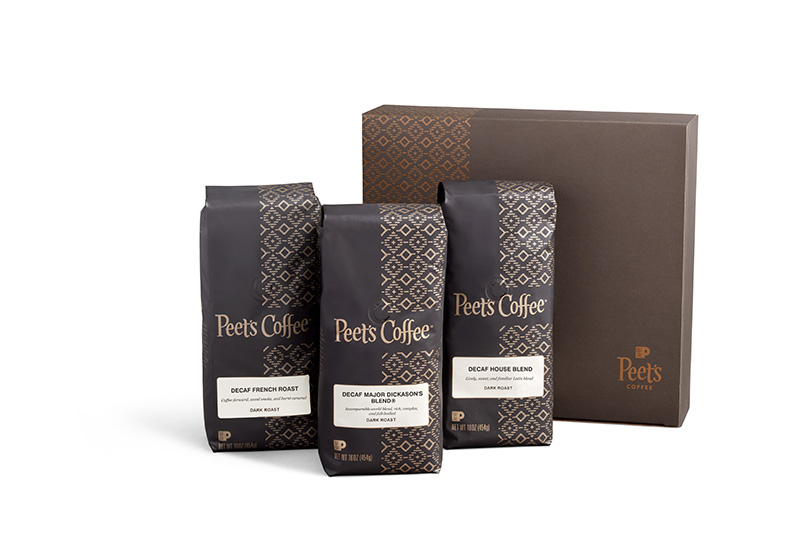
Seven Myths About Decaffeinated Coffee
Is decaf coffee completely devoid of caffeine? Is decaf coffee weaker than regular coffee? Where does decaf coffee come from? The topic of decaffeinated coffee has caused lots of questions and plenty of speculation. We can help. Here are seven facts to help clear up the most common misconceptions about decaffeinated coffee and turn you into a Decaf Expert.
MYTH 1: There is no caffeine in decaffeinated coffee.
Decaffeinated coffee still contains trace amounts of caffeine. In general, an 8 oz. cup of decaf contains 5-10 mg of caffeine, while the average 8 oz cup of regular coffee contains around 95 mg. (The average cup of Peet’s can go as high as 125 mg.) The caffeine level in a cup of coffee depends on a variety factors, from the grind and brewing method you select, to the temperature of water used and amount of time it’s immersed.
MYTH 2: All decaffeinated coffee tastes weak.
If you’ve had weak tasting decaf, the real culprit is the beans that were used.
The reason Peet’s decaf is described as tasting "like the real thing” is that we select the exact same high-quality coffees for decaffeination that are in our regular coffees. For instance, Peet's Decaf House Blend is the same blend of coffees as in our best-selling, fully caffeinated version. We’d happily put any of our decafs up against other roasters’ coffee for flavor, caffeinated or not.
MYTH 3: Decaffeination happens after the coffee has been roasted.
The decaffeination step occurs very early on, when the coffee is still green, well before it’s been roasted. The process of decaffeination involves swelling the beans with water in order to allow the caffeine to be extracted. So if you were to put coffee that’s been roasted into a decaffeination bath, you’d essentially be making vast amounts of coffee.
MYTH 4: Decaffeinated coffee is full of chemicals.
There are two primary methods of decaffeination most roasters utilize. The first is a water process that uses (you guessed it) a water solution to plump up the beans and allow the caffeine to be extracted. This is the method Peet’s uses for all decaffeinated coffees.
The second method of decaffeination is most common and works in a similar way but uses a wash to draw the caffeine out of the soaked beans. While a chemical touching food never sounds good, the reality is, almost all of it evaporates immediately afterward due to exposure to heat during the drying stage.
MYTH 5: The “Swiss Water Process” only happens in Switzerland.
While there are several companies that specialize in water process decaffeination, only one company is able to use the trademarked term “Swiss Water Process”: the Swiss Water Decaffeinated Company. However, it’s located in Canada, not Switzerland, and it does not use water that is “Swiss.”
MYTH 6: Coffee roasters decaffeinate their own coffee.
Decaffeination is not done by roasters, but by companies that specialize in the decaffeination process. In fact, coffee decaffeination is primarily done outside of the United States, mainly in Canada (see Myth #5) and Mexico.
MYTH 7: There is a breed of decaffeinated coffee plants.
Nope. Genetically speaking, caffeine is in all 100+ species of coffea, though the levels of caffeine vary somewhat. For instance, there’s more caffeine in coffea robusta than there is in coffea arabica. However, the reason Peet’s exclusively selects arabica coffee is due to its superior flavor, not caffeine content.

Why people say that Peet's Decaf coffees taste "like the real thing."
If people say Peet’s decaf doesn’t taste like decaf, it’s with good reason: every Peet’s decaf, from our Decaf Sumatra to our famed Decaf Major Dickason’s Blend, is made with the exact same high-quality coffee beans that we offer on our regular bean menu. Most roasters don’t source their own coffees first, relying instead on the decaffeinator for their beans, but starting with superior coffees is the only way to guarantee a decaf with so much depth and rich flavor it tastes "like the real thing.”
I've been drinking Peet's Sumatra decaf for years and love it! I get a rich, full bodied cup that blows away anybody else's decaf. I get such great coffee flavor that I don't even miss the caffeine.
—Walt79
My husband, Mr. Caffeine himself, raved, saying it was better than any caffeinated coffee he'd ever tasted. The flavor is strong, robust but not bitter. I would never have believed this could be a reality for me. I LOVE IT."
-SamTheGirl
I have had a standing order for Decaf French roast. This is the best: no other decaf French roast comes close to it.
-marizona50


